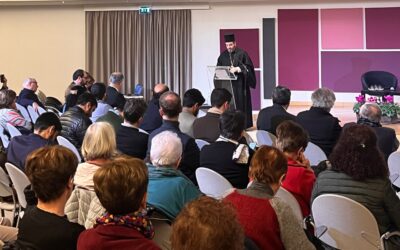
The meeting in Castelgandolfo – (C) Thomas Klann
The course was opened with words by Chiara Lubich: “The charism of unity [. . .] fell upon a young Christian woman who God wished to be Catholic. But [. . .] it wasn’t only for the Catholics; that wouldn’t have made any sense, it’s for all Christians.” The course on Pentecostalism was presented by the Focolare’s office for ecumenism and held in Castelgandolfo, Italy. Pentecostalism is a renewal movement in Christianity that began in the United States in 1901 (with antecedents in previous centuries), and it continues to grow.

Udo and Ilona Knoefel, founders of the Jesus-Gemeinde Sohland Pentecostal Community – (C) Thomas Klann
Five lectures were presented by experts: Professor Teresa Rossi from the Angelicum Pontifical University of Rome; Msgr Juan Usma from the Pontifical Council for the Promotion of Christian Unity; Pastor Albert Pataky, President of the Pentecostal Church of Hungary; Michelle Moran, President of the International Catholic Charismatic Renewal (ICCRS) and the
Jesus-Gemeinde Sohland (Sohland Jesus-Community)
Pentecostal Community founded by Udo and Ilona Knofel in Germany.
The course was attended by over a hundred people – Pentecostals, members of the Reformed Church, Catholics, one Lutheran and one Orthodox Christian – from twenty European countries, Brazil and Korea. Professor Rossi outlined the history and development of Pentecostalism. Msgr Usma described the dialogue with the Catholic Church, stating that it is “a complex phenomenon with which the Vatican had agreed to dialogue.” It should be noted that there was Pentecostal observer at the Second Vatican Council. He cited the
Aparecida document, published by the Latin American Bishops in 2007, which underlines the fact that many Catholics are migrating towards Pentecostalism, not because of doctrinal or theological reasons but because they are looking for God.
President of the Pentecostal Church of Hungary, Albert Pataky, regularly attends an ecumenical group promoted by the Focolare that meets once a month to reflect on the Word of God. “Our Movement,” he recounted “was begun in prayer, which continually strengthens and renews us.” One community, which was formed around Udo and Ilona Knofel in East Germany during Communism, was not accepted by the local Evangelical Church because of its charismatic style. Through its contact with the Focolare Movement in 2004, the community sought reconciliation. Now it is spreading Jesus’ name in regions of Europe that are considered to be the “most atheistic”. 
Olivier Fleury and Raphael Tanner (Switzerland), Mons. Juan Usma Gomez (Pontifical Council for Promoting Christian Unity)
– (C) Thomas Klann







0 Comments